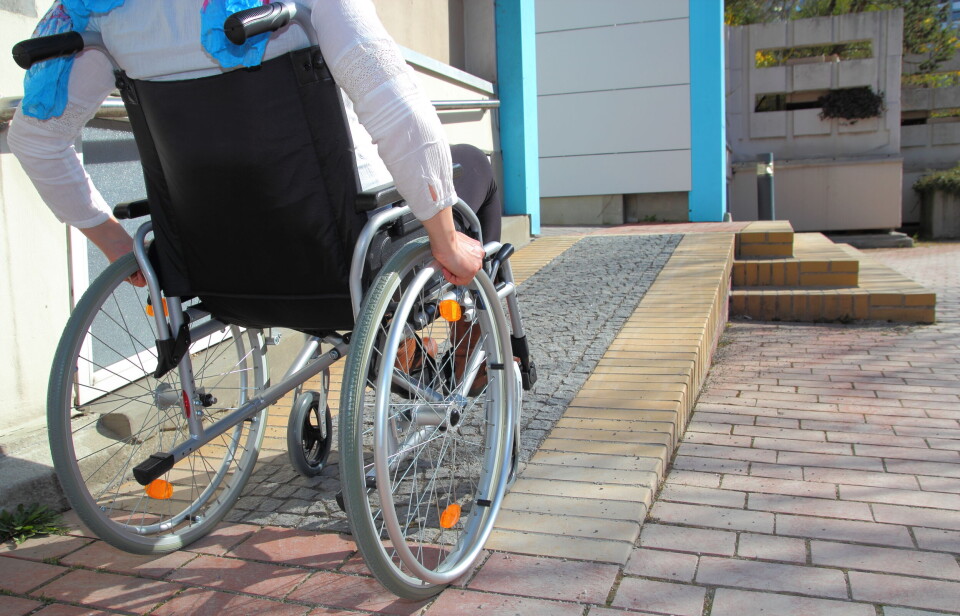-
New day-trip ferry service starts from France to Jersey
Travellers can spend up to five hours on island before returning to mainland
-
Tour de France 2025: will the route pass near you next week?
Both the men’s and women’s races will be held entirely in France this year
-
Photos: have you visited Saint-Antoine-l'Abbaye, France’s favourite village 2025?
This year’s village préféré des Français is home to a 1095 Gothic Abbey
Free wheelchairs do not go far enough, say French disabled groups
Other reforms promised by government, including improved access at railway stations, were also criticised for lacking ambition and clarity

The cost of wheelchairs will be fully reimbursed from next year as part of a raft of measures to help disabled people in France.
The announcement was made by President Emmanuel Macron at a recent national conference for disabled people, held every three years.
Crucially, it came shortly after the Council of Europe ruled that France was breaking international treaties on human rights by not doing more for people with disabilities.
Groups representing the 12 million French people and eight million carers concerned were critical of the government’s response, however, insisting its proposals lack both ambition and clarity. Mr Macron outlined five areas of focus, including giving more direct help, such as the wheelchair policy.
At present, social security reimburses only part of the cost, and insurance can supplement this, with amounts varying according to policy.
430,000 disabled state school children
With 430,000 disabled children now in inclusive state schools – a figure that has risen sharply in the last six years – Mr Macron also addressed education concerns.
From September, there will be more money for people who accompany disabled students in school and the possibility that some helpers will be able to get full-time jobs (35 hours a week) by covering lunchtime and extracurricular activities.
Currently, almost all of them are part-time, as the state can employ them only during school hours.
They are paid an average of €800 per month.
Unemployment rates for disabled people are now around 14%, compared to 18% in 2017 when Mr Macron was first elected president.
His objective is to lower that to 6%, partly by changing apprenticeship conditions to give more help to firms that employ disabled people.
Work contracts under the ESAT regime (Etablissements ou services d’aide par le travail) will also be changed so disabled employees get the same rights as other workers, including to strike and form unions.
Mr Macron added that “it is not acceptable for these workers to be paid 60% of the minimum wage”, although no timetable was set for the changes.
Access to public buildings
To improve access to public buildings and government websites, Mr Macron has budgeted €1.5billion, of which €400million will be spent by 2027 to improve disabled access in railway stations.
Currently, only 3% of Paris metro stations are accessible to wheelchair-users.
The Paris transport network (RATP) has promised that 32 out of the 300 metros will be accessible in 2024, and all new lines will be wheelchair-adapted.
In terms of financial aid, Mr Macron said that, since 2017, AAH (Allocation aux adultes handicapés) benefits had risen by 20%. He said the government would now work to ensure that these can be claimed individually when recipients are living as a couple in the same home.
He pledged: “From October, 120,000 people living as couples will see their AAH rise by an average of €350 a month.”
Olympics
There was also a commitment to better sports access by building on infrastructure to be put in place for the Olympic and Paralympic Games next year.
This includes a fivefold increase in the number of taxis that are adapted to take disabled passengers.
The conference was boycotted by several associations, including Collectif Handicaps, which represents 52 smaller groups.
Spokesman Stéphane Lenoir told The Connexion that it had participated in all the discussions leading up to the conference, but nothing had been decided by the President 24 hours before it was due to start.
“After hours of work, we had no idea if the announcements would be equal to our expectations,” he said.
“We wanted the measures to be ambitious and, above all, budgeted.”
Another reason for the boycott was that the conference agenda made no reference to the Council of Europe ruling.
The association had pushed for proceedings to be postponed so there could be considered responses from government and disabled groups.
“When this was turned down, we asked if we could take the floor and have a debate on the issue with President Macron, but this was also rejected,” said Mr Lenoir.
Lacking substance
He admitted the association found many of the promises made by Mr Macron “interesting”, but lacking in substance, especially given that there was no announcement of an annual budget dedicated to the needs of disabled people.
This was emphasised by differences that the Collectif Handicaps found between the written speech given to the media, and that made by Mr Macron on the day.
A promise to provide a right of access for disabled people to a place of work, for example, was omitted from Mr Macron’s address.
“We need more details to really understand what the announcements mean, and to know how they will be put in place,” said Mr Lenoir.
Related articles
‘French society is built around the economy not the right to dignity’
Can you rent an armchair suitable for a disabled person in France?
Disabled couple excluded from French energy price protection
























